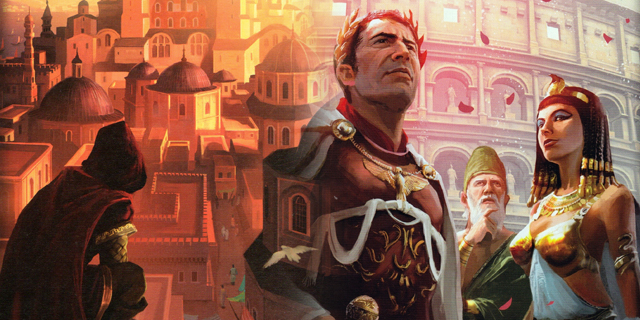
In 2011, 7 Wonders just narrowly missed being named my Game of the Year. A lot of excellent games came out between my first play of it late in 2010 and the finalization of my Year-End column, and through them all 7 Wonders continued to impress me with its fast-playing draft-style take on the popular civilization-building genre. And in similar fashion, a lot of other excellent games have passed over my gaming table in the last year, which left me little time to re-explore 7 Wonders via two expansions released in the interim until very recently.
The first of these expansions, Leaders, was released in late 2011. It introduces an entirely new class of cards (Leader cards, obviously) and a new phase of each Age in which to play them. These white cards with unique backs depict various historical figures and each offers some sort of game-altering benefit for recruiting them. A lot of them provide additional victory points, others supply additional coins, a few offer building discounts, and one is even capable of turning your neighbors’ military strength against them. What they all have in common, however, is that it costs coins to recruit them. As such, when playing with the Leaders expansion each player begins with six coins instead of the usual three. On the subject of coins, the expansion also includes six-coin tokens, which are neat but a little awkward with my wooden first edition coins (subsequent printings of 7 Wonders used cardboard coins).
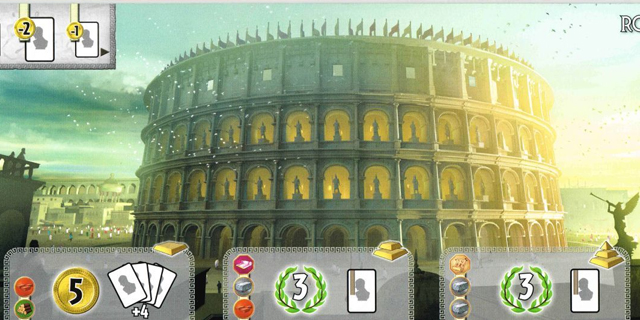
At the beginning of the game, after Wonders have been assigned, players are first dealt out four Leader cards. They will choose one of these and pass the rest to their right, repeating that process until all players have drafted a hand of four cards. Prior to dealing out each Age’s cards, players may select one of their Leaders and either recruit them by paying their cost, use the card to build a stage of their Wonder (not usually an option before Age I but possible in some circumstances), or discard it for three coins. After this Leader phase the Age is played out normally.
Recruited Leaders can drastically affect the way you select and play out the cards you get passed each Age, and gives each player a unique and somewhat customizable experience beyond any strategy that might be inherent to their Wonder. One-time purchases of Leaders can pay off huge dividends in the long run if you plan accordingly (and the right cards get passed to you). Or you can choose to not be distracted by them and instead enjoy the cushion of extra cash and additional Wonder-building opportunities. A few Leader-oriented Guilds (purple Age III cards) and a new Leader-specific Wonder are included to make the cards relevant in other ways as well.
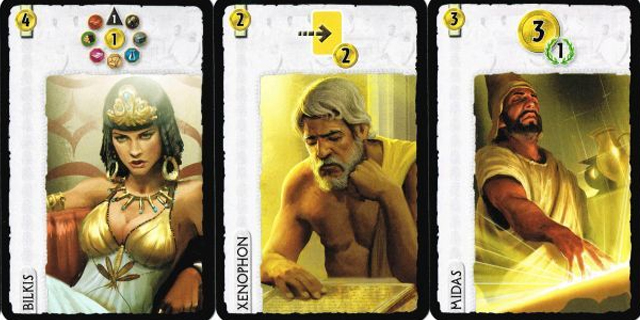
The second and most recent expansion, Cities, also includes a few new Wonders, Leaders, and Guilds, but the main additions this time around are the eponymous City cards. These black cards are randomly inserted, one per player, to each of their respective Ages’ decks. As a consequence, a game including the Cities expansion will feature seven cards played each Age instead of the usual six (plus Leader cards, if any). Most of the City cards will include coins as part of their costs, and in fact most of the expansion revolves around coins in some way.
One of these ways is via the new “broken coin” symbol. This symbol indicates that all other players – not just your neighbors – must pay that many coins to the bank when its card (or Wonder stage) is built. Failure to pay will result in penalizing Debt tokens to the tune of a lost VP per coin not spent. Paying that cost is optional if you really need the cash, but obviously if you can’t afford the tax then you have no choice. This symbol can also be combined with other symbols to tax specific things, like Wonder stages or military victory tokens.
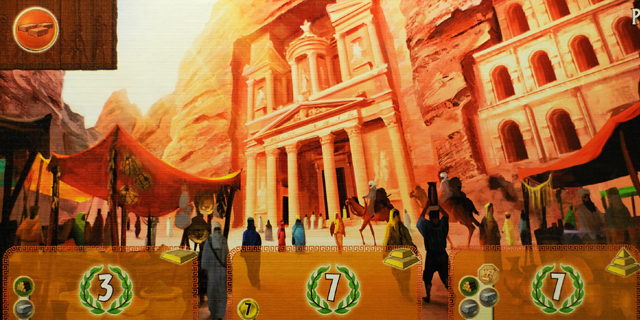
Another major symbol introduced in Cities is the Diplomacy symbol. Obtaining one of these (through various means) allows a player to not participate in any military conflict at the end of that Age. Instead, that player’s neighbors will fight each other directly; in the event that only two players are non-Diplomats in a given Age, they fight each other only once instead of the usual “one fight per neighbor”. This is a one-time benefit, even if you receive multiple instances of the symbol, but it can really mess with your neighbors’ military plans while letting you avoid what would probably have been a loss of two VP.
The final major symbol is the peculiar Mask, which copies any one Science card played by a neighbor for scoring purposes (not for upgrades, sadly). If your neighbors aren’t pursuing Sciences then the Masks will be of little use but in the right circumstances they can earn you a ton of VP for very little investment. The Mask icon (on the bottom of all Cities cards) also serves as a recognizable expansion symbol for the expansion as a whole, allowing you to quickly remove its cards from the various decks should you wish to, say, only play with Leaders. The expansion symbol is also useful for indicating which rule book explains the symbols on the card should you need to look something up (mostly relevant for the Leaders).
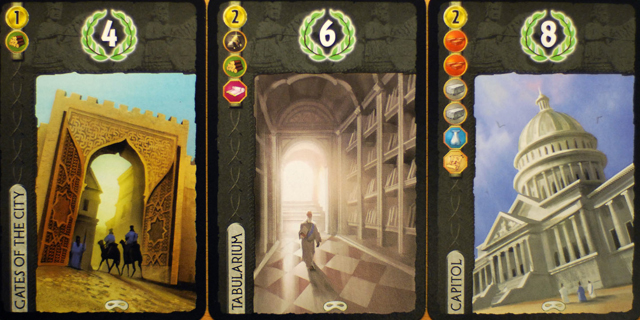
Overall, the additions in Cities aren’t as dynamic as those in Leaders but they do provide some interesting twists. I haven’t tried playing with Cities but without Leaders (and thus without the six Leaders in Cities) yet, and I don’t really think I would want to as I really enjoy what Leaders brings to the game. If you can only afford one of the expansions (both retail for around $30), then Leaders is the clear pick. Cities has its charm, however, and also includes Team rules should you have eight players wanting to participate at the same time instead of the game’s usual cap of seven. Whichever expansion(s) you choose to enhance it (if any), 7 Wonders remains a great quick-playing activity for group just about any size.



















